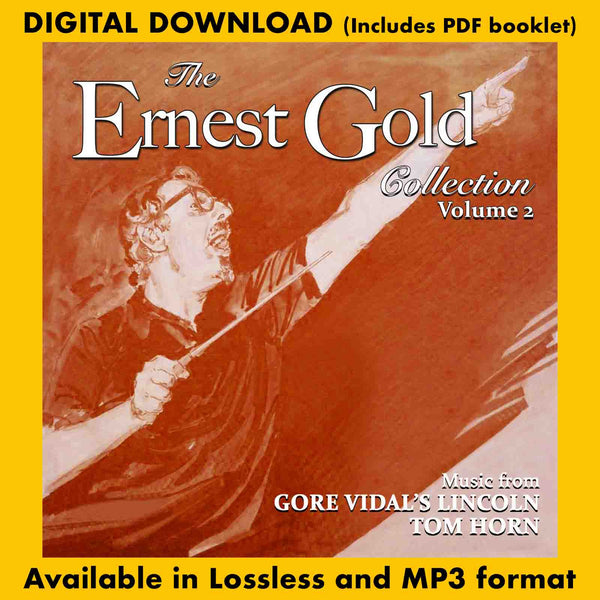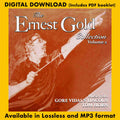
Release Date:
Downloads include choice of MP3, WAV, or FLAC
DDRDG793
Includes Digital Booklet
Click Here for CD Release
Dragon’s Domain Records presents THE ERNEST GOLD COLLECTION, VOLUME 1, featuring music composed by Ernest Gold (EXODUS, TOM HORN, WALLENBERG: A HERO’S STORY) from several projects in his rich filmography for the very first time.
While the composer is best remembered for his acclaimed scores for Stanley Kramer and Otto Preminger, the B-movie projects earlier in his career presented plenty of musical gold of their own and with the first volume of THE ERNEST GOLD COLLECTION, we are pleased to offer a sampling of these, ranging from his second film score in 1946 to one of his last works in 1982. These tracks demonstrate Gold’s versatility in a number of different motion pictures throughout three decades of film scoring.
THE ERNEST GOLD COLLECTION, VOLUME 1 includes music from EXPOSED, SMOOTH AS SILK, THE NAKED STREET, UFO, MAN ON THE PROWL, WINK OF AN EYE and concluding with his score to SAFARI 3000, also known as TWO IN THE BUSH from 1982.
Ernest Gold came to the United States from Vienna in 1938, prompted by Hitler’s invasion of Austria, and started working as a piano accompanist and as a popular songwriter in New York City. Growing disillusioned by songwriting, Gold headed west in 1945, following an interest in writing music for Hollywood films. Within two weeks of his arrival in early July, Gold was quickly put to work scoring THE GIRL OF THE LIMBERLOST for Columbia Pictures. He would score forty B-movies of all types for numerous studios through the late 1950s for a variety of studios. Gold never lost track of his Viennese musical heritage and contributed first-rate musical scores to dozens of films big and small.
He began studying with composer George Antheil in 1947, early in his Hollywood career. During the 1950s he began orchestrating Antheil’s scores, and when Antheil began scoring Stanley Kramer’s pictures, Gold came along with him. When Antheil died before finishing the score for Kramer’s next film, the post-apocalypse drama, ON THE BEACH (1959), Gold assumed his role as Kramer’s primary composer, scoring such films as INHERIT THE WIND (1960), JUDGMENT AT NUREMBERG (1961), and Kramer’s blockbuster comedy, IT’S A MAD, MAD, MAD, MAD WORLD (1963). Meanwhile, his association with Kramer led to other A-list movies, including Otto Preminger’s EXODUS (for which Gold won an Academy Award for best score and two Grammys for best soundtrack album and best song) and Sam Peckinpah’s war movie CROSS OF IRON (1977). Gold's contributions were recognized with four Academy Award nominations and three Golden Globe nominations. His work for ON THE BEACH also won Gold a Grammy Award. The Hollywood Walk of Fame has also recognized him with a star on the famed Hollywood Boulevard. Gold composed the music for the 1968 Broadway musical I’M SOLOMON. His classical works also included a piano concerto, a string quartet, and a piano sonata.
Dragon’s Domain Records presents THE ERNEST GOLD COLLECTION, VOLUME 1, featuring music composed by Ernest Gold from several projects in his filmography,appearing for the very first time on Digital. The music has been mastered by James Nelson at Digital Outland and the liner notes have been written by author Randall Larson.
Reviews
THE ERNEST GOLD COLLECTION VOLUME 2
Ernest Gold
$8.95
Downloads include choice of MP3, WAV, or FLAC
DDRDG793
Includes Digital Booklet
Click Here for CD Release
Dragon’s Domain Records presents THE ERNEST GOLD COLLECTION, VOLUME 1, featuring music composed by Ernest Gold (EXODUS, TOM HORN, WALLENBERG: A HERO’S STORY) from several projects in his rich filmography for the very first time.
While the composer is best remembered for his acclaimed scores for Stanley Kramer and Otto Preminger, the B-movie projects earlier in his career presented plenty of musical gold of their own and with the first volume of THE ERNEST GOLD COLLECTION, we are pleased to offer a sampling of these, ranging from his second film score in 1946 to one of his last works in 1982. These tracks demonstrate Gold’s versatility in a number of different motion pictures throughout three decades of film scoring.
THE ERNEST GOLD COLLECTION, VOLUME 1 includes music from EXPOSED, SMOOTH AS SILK, THE NAKED STREET, UFO, MAN ON THE PROWL, WINK OF AN EYE and concluding with his score to SAFARI 3000, also known as TWO IN THE BUSH from 1982.
Ernest Gold came to the United States from Vienna in 1938, prompted by Hitler’s invasion of Austria, and started working as a piano accompanist and as a popular songwriter in New York City. Growing disillusioned by songwriting, Gold headed west in 1945, following an interest in writing music for Hollywood films. Within two weeks of his arrival in early July, Gold was quickly put to work scoring THE GIRL OF THE LIMBERLOST for Columbia Pictures. He would score forty B-movies of all types for numerous studios through the late 1950s for a variety of studios. Gold never lost track of his Viennese musical heritage and contributed first-rate musical scores to dozens of films big and small.
He began studying with composer George Antheil in 1947, early in his Hollywood career. During the 1950s he began orchestrating Antheil’s scores, and when Antheil began scoring Stanley Kramer’s pictures, Gold came along with him. When Antheil died before finishing the score for Kramer’s next film, the post-apocalypse drama, ON THE BEACH (1959), Gold assumed his role as Kramer’s primary composer, scoring such films as INHERIT THE WIND (1960), JUDGMENT AT NUREMBERG (1961), and Kramer’s blockbuster comedy, IT’S A MAD, MAD, MAD, MAD WORLD (1963). Meanwhile, his association with Kramer led to other A-list movies, including Otto Preminger’s EXODUS (for which Gold won an Academy Award for best score and two Grammys for best soundtrack album and best song) and Sam Peckinpah’s war movie CROSS OF IRON (1977). Gold's contributions were recognized with four Academy Award nominations and three Golden Globe nominations. His work for ON THE BEACH also won Gold a Grammy Award. The Hollywood Walk of Fame has also recognized him with a star on the famed Hollywood Boulevard. Gold composed the music for the 1968 Broadway musical I’M SOLOMON. His classical works also included a piano concerto, a string quartet, and a piano sonata.
Dragon’s Domain Records presents THE ERNEST GOLD COLLECTION, VOLUME 1, featuring music composed by Ernest Gold from several projects in his filmography,appearing for the very first time on Digital. The music has been mastered by James Nelson at Digital Outland and the liner notes have been written by author Randall Larson.
Reviews


